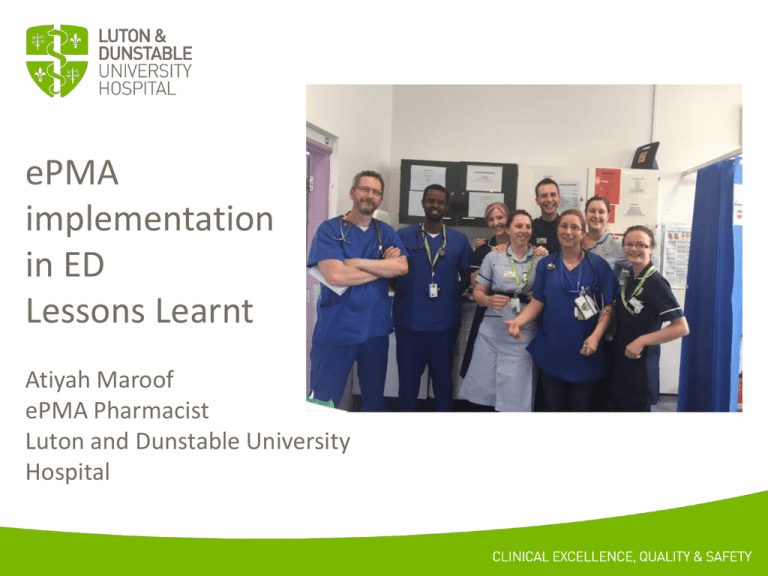
ePMA
implementation
in ED
Lessons Learnt
Atiyah Maroof
ePMA Pharmacist
Luton and Dunstable University
Hospital
Agenda
•
•
•
•
•
•
L&D ePMA Project Plan
Options for ED Go Live
ED IT interface
Patient Pathways
L&D ePMA Go-Live in ED
Problems faced & Solutions
implemented
L&D ePMA Project Outline
Options to go live in ED
• Speciality teams review patients in ED
• If a Decision To Admit (DTA) is made
subsequent medication is prescribing in ED
• Option 1: The whole ED Department
•
•
•
•
Complete prescribing/administration profile on ePMA
All ED admissions on ePMA system
LDUH ED department due to be rebuilt next year
Current ED infrastructure does not support for ePMA go live
in whole ED department
• ePMA not yet implemented in Maternity and Paeds so will
not support patient flow.
Options to go live in ED
• Option 2: Patients being admitted into hospital
only
• Speciality teams to transcribe patients onto ePMA at point of
a DTA a patient
• Will help reduce current transcription burden on ePMA live
areas
• Incomplete prescribing/administration profile on ePMA as ED
will use paper
• ED admissions on paper and cannot be referred to easily
Options to go live in ED
• LDUH Preferred Option:
• To Go Live with DTA to reduce current transcription
burden
• Followed by Option 1 once Maternity and Paediatrics
live with ePMA and ED department has been re-built.
ED Interface
Patient
presents
in ED
ED attendance
documented in
Symphony
Episode
opens on
ePMA
• This is not a simple step!
Patient
admitted
into
hospital
PAS
episode
takes over
ED
attendanc
e
• Allow for plenty of time to liaise with all parties
• Vigorous testing is required
Patient Pathways
• Ensure that all patient pathways from ED are
well mapped out
• Surgical/Medical/Contingency areas/Gynae/Critical
Care/Paeds/Outliers
• Very complex pathways were identified
• Maintain a close working relationship with the
ED teams
• Regular meetings were held with ED matron and lead ED
consultant
• All process maps were approved and signed off by the
relevant staff
EPMA Go-Live in ED
• ED went live with DTA 7th July 2015
• IT interface issues caused the delay in rolling
out
• Timing is everything!
• Best time for go live was identified as 7am
• Quietest time in ED & before all handovers
and safety briefings
• ePMA attended ED and speciality team
handovers during implementation
EPMA Go-Live in ED
• ePMA floor walking support 24 hours/day for 7
days
• Further 14 days 6am-11pm to encourage and help
support speciality teams
• At this point paper prescription charts were not
removed as not all adult base areas were live
with ePMA
• Gynaecology ward was outstanding
• Maternity and Paeds emergency patients treated in separate
areas
Problems Faced
• Paper prescription charts were started by ED
team, but were not being transcribed by
speciality teams despite encouragement
• ePMA transcription service ceased at the point of ED go live
• Number of prescription charts increased on ePMA base
wards
• Increased risk of dual process
• Not enough hardware in ED for speciality
teams
• Hardware not fast enough in ED to help
facilitate process
Problems Faced
• Gynaecology ward was not live with ePMA
• Adult ED was live for DTA but could not include
gynaecology patients
• Caused confusion amongst staff
• Surgical/medicals outliers placed on this ward
• Some senior clinicians required more support
at this point as they had not used ePMA as
much as junior doctors prior to ED ePMA
implementation
Solutions implemented
• ED STAT chart introduced
• All paper prescription charts removed from ED
and base wards
• Gynaecology ward go-live bought forward
• Additional desktop PCs with Virtual Desktop
Infrastructure (VDI) deployed to ED to help
facilitate process
• Further support given to speciality teams
What is next?
• Maternity and Paeds ePMA Go-live
• Jan/Feb 2016
• Implementation of ED in whole ED department
planned for March 2016
• To purchase bespoke handheld devices
Question Time





